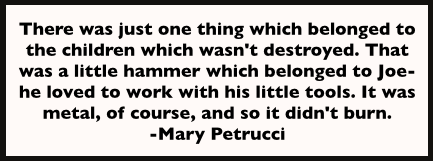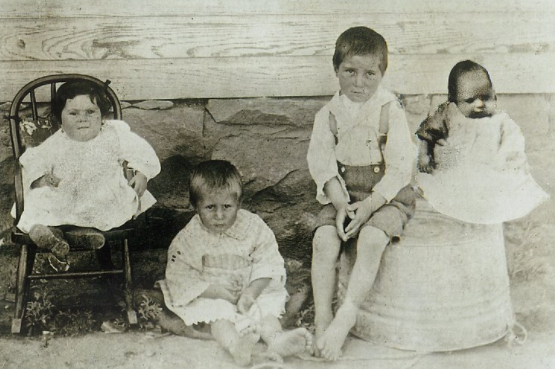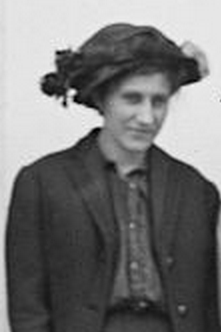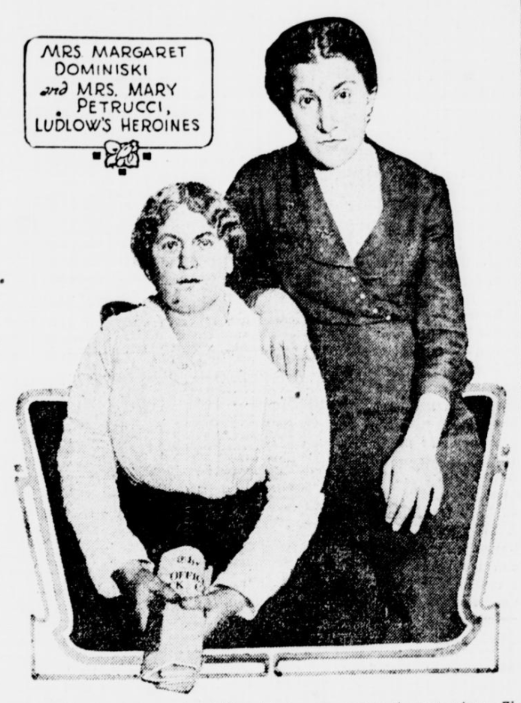
Hellraisers Journal: Thursday February 4, 1915
From the New York Tribune:
-Mary Petrucci Remembers Her Four Little Children
WE NEVER FORGET

Who lost their lives in Freedom’s Cause
Lucy, Joe, Barnard, and Frank

Once again, Mrs. Mary Petrucci has come east from the coal camps of southern Colorado to give testimony about the long struggle of the miners there. It was during this struggle in Freedom’s Cause that she and her husband lost all four of their children. The eldest, six-year-old Bernard, grew sick last March and died in the Ludlow Tent Colony after the militia refused to let Mary take him to a doctor in Trinidad. The three other children Joe-4, Lucy-2, and the baby, Frank-6 months, were murdered in April by the gunthug militia during the Ludlow Massacre. All three children were suffocated when the militia set the tent on fire over their heads as they sought shelter in the cellar beneath the floor, hiding from machine gun fire.
Mrs. Petrucci has come to New York accompanied by another miner’s wife, Mrs. Margaret Dominiski. Their testimony before the Commission on Industrial Relations will be thoroughly covered by Hellraisers over the next few days. Today we wish to present a long interview with Mary Petrucci conducted by Lucy Huffaker for the “Woman’s Varied Interests” section of the Tribune. Mary Petrucci hopes that by telling the story of her little children, their sacrificed lives will count toward the betterment of workers everywhere. During the interview, she stressed that she and her husband are still strong for the union despite their terrible loss. She concluded the interview with this statement:
But you’re not to think that we could do any differently another time..We are working people-my husband and I-and we’re stronger for the union than we were before the strike. We’ve paid-I guess you’ll admit and everybody will-that we’ve paid a pretty big price for our belief. I don’t know just how any man and woman can do more than have their children, all their children, taken from them, do you? But we’re not ‘scabs.’ We never have been and we never will be. There is sorrow in our hearts, and there always will be, but there isn’t any dishonor.
I can’ have my babies back..But perhaps when everybody knows about them, something will be done to make the world a better place for all babies. At least, I like to think so. It is the only thing which gives me any comfort.
From the New York Tribune of February 4, 1915:
WOMAN’S VARIED INTERESTS
That the Sacrifice of Her Three Children’s Lives May
Count for Workers’ Betterment, Mary Petrucci
Goes About Telling Ludlow’s Story.A Visit with the Italian Wife of Colorado Miner, a Woman
Whose Individual Grief Has Transformed Her
Into a Fighter for Her People,
the Workers of the World.BY LUCY HUFFAKER.
As if deliberately planned as climax to testimony of men who presumably control this country’s capital, Mrs. Mary Petrucci, wife of a Colorado miner, appeared before the Federal Commission on Industrial Relations Wednesday and told her story. That story, which is already a classic in the labor movement’s history, often and often has she told it, and you, as I, have read it.
So it was not curiosity about what she would tell that sent me to her; it was a desire to know why and what she was. And I found her a sombre-eyed young Italian women, whose chief emotion was anxiety to be with her husband, who is back at work in the mine. Rachel mourning for her children-Niobe and her woe-I had thought of them as expressing Mary Petrucci. But I saw that she was something more. She was a woman defiant, a woman who would fight not only for herself and those of her own household, but for all her own people-and that means, to Mary Petrucci, the workers of the world. She doesn’t like to tell her story. “But surely it will help some-surely my babies weren’t sacrificed for nothing,” she says. And believing that, she is willing to appear before commissions or any one else who will hear her story.
Therefore she recited the tale of her tragedy, and now she will go back to Colorado to her lonesome husband; but one thing she wants to do before she returns-talk to John D. Rockefeller, jr.
“I wouldn’t take but a minute or two of his time, Mrs. Petrucci said to me. “He knows my story now. Everybody does. But I’d like to ask him how he thinks he’d feel if he had had three children smothered to death as mine were last April. I want to ask him that. Then I want to go back home.”
Her voice was calm and her manner quiet as she said that. In fact she talked all the time in something like a monotone. There was nothing obviously dramatic in her manner. Perhaps that is why it was so effective. She talked on, telling of the horrors which she had seen and which she had felt, just as if she were telling one of the most commonplace stories in the world. Ohly once did she seem about to cry. And then it was one of those inconsequential little things, and not the tragedy, which made the tears come her eyes. She had picked up my card and looked at my name.
Name Recalls Tragedy.
“Oh,” she said and there was something very close to a sob in her voice, “is your name Lucy? That-that was my little girl’s name.”
She clasped her hands tightly in her lap and waited for a minute before she went on talking, as if she were trying to regain her control over herself. Mrs. Margaret Dominiski, also from Ludlow, patted her on the shoulder.
“I’m not going to cry,” said Mrs. Petrucci. “Someway I haven’t cried much-only I couldn’t keep from it wen Mr. Costigan went on the stand at the hearing and told of the massacre. Then I could hear those machine guns-I hear them so much. And I could taste that smoke which poured into the cave where we had gone for protection, the smoke which smothered my three children. I shall hear those machine guns, I’m afraid, as long as I live. Sometimes I think I’ll hear them after I’m dead, too.
“I Don’t Sing Any More.”
“Perhaps it seems strange to you that I want to go back home. But I do. My man is there and my children are buried there, and I don’t believe I could ever live anywhere else. I have been so happy there. Why, there wasn’t a happier woman anywhere than I was, was there, Maggie?” she appealed to Mrs. Dominiski. “You see I’m Italian, although I was born in this country, and our people are gay of heart. I used to sing around my work and playing with my babies. Well, I don’t sing any more. And my husband doesn’t laugh as he used to do. I’m twenty-four years old and I suppose I’ll live a long time, but I don’t see how I can ever be happy again. but I try to be cheerful on account of my husband. It is so hard for him when he comes home from work to find only me in the house, and none of the children.
“Sometimes he thinks I oughtn’t to go so often to the graves of the children, but something inside me makes me go. And I guess looking at those mounds can’t make me feel any worse than I do, anyway. You see I didn’t know for a while that the children were dead. When I came out of that cave where I had been all night, I was dazed. It was days-I think nine-before I really knew that Joe and Lucy and Frankie, who was the baby, were dead. I’d gone, it seems, to the station so I could go to my mother who was in Trinidad. Somebody must have paid my fare. I didn’t have any money, of course. But I don’t remember that at all. They say I was crazy, and I suppose I was just like a child who always wants to go to her mother when she is in trouble.
“They say that my children had a decent burial. I only know what they tell me. And when I got back home there was nothing left to remind me of them. You see our tent had been burned down. All the clothes and the toys which belonged to the children were gone. I guess that is just as well. I don’t believe I could stand it to see one of Lucy’s dolls. She was only two years and seven months old, but she could talk just as well and fast as anyone.
“I’m Glad that Doll Was Burned.”
“When her father came home from work, he used to tell her that he was going to spank her. That was one of their jokes, and she knew he didn’t mean it. Then she’d tell her doll that she was gong to spank it. But instead she’d hug it close to her and kiss it. I’m glad that doll was burned. There was just one thing which belonged to the children which wasn’t destroyed. That was a little hammer which belonged to Joe-he loved to work with his little tools. It was metal, of course, and so it didn’t burn.
“It’s a good thing I’d given my mother and my sister pictures of the children, or I wouldn’t have any-all I had were burned. I’ve had all of them enlarged. They were such pretty children and such strong ones. They had thrived when we went to live in the tent colony. Why shouldn’t they? Everybody is saying now that it is good for children to be out of doors all the time, even to sleep there. And our tents were very comfortable and the stoves kept them warm and dry. I used to bathe the baby-he was just six months old-every day just as I did before we went to the tent colony. We were all right there until ‘Bloody Monday.’ But it has been all wrong ever since.
Makes Less than Before Strike.
“My husband went back to work when the strike was called off. I don’t understand just why the strike was called off, but anyway it was and the men went back. My husband, before the strike, made $3.40 a day-now he makes only $3. But then there was a family to support. Now there is only himself and me.
“They try to console me by telling me that I may have other children. I’m young and there may be other babies. But they won’t be those same babies. And although I’m so lonely without ’em-sometimes it seems to me the days will never end, because there is nothing for me to do now that I haven’t the children to take care of-I don’t know whether or not I want any more. I’ve lived through it once. But I don’t believe I ever could stand it to lose another child. It was bad enough when Barney, my eldest child-he was six years old-died last March. But that couldn’t be helped, I suppose. And I like to think that he wasn’t sacrificed as the other three were. I don’t know that I want to run the risk of having any more children murdered as Joe and Lucy and Frankie were.”
I didn’t say anything to that, because there didn’t seem to be anything to say. Mrs. Dominiski, who, except now and then when she would suggest a name or an incident to her friend had sat as quietly as I while Mrs. Petrucci had been talking, nodded her head.
“I know how you feel,” she said, “Even if I din’t lose my children, I know how you feel.”
And then-and this is the memory which I shall keep of Mary Petrucci-the sorrowing mother became something else. She held up her head proudly, and looked me right in the eye.
“Paid for Our Belief.”
“But you’re not to think that we could do any differently another time,” she said. “We are working people-my husband and I-and we’re stronger for the union than we were before the strike. We’ve paid-I guess you’ll admit and everybody will-that we’ve paid a pretty big price for our belief. I don’t know just how any man and woman can do more than have their children, all their children, taken from them, do you? But we’re not ‘scabs.’ We never have been and we never will be. There is sorrow in our hearts, and there always will be, but there isn’t any dishonor.
“I can’t have my babies back” she concluded.”But perhaps when everybody knows about them, something will be done to make the world a better place for all babies. At least, I like to think so. It is the only thing which gives me any comfort.”
———–
SOURCE
New York Tribune
(New York, New York)
-Feb 4, 1915
https://chroniclingamerica.loc.gov/lccn/sn83030214/1915-02-04/ed-1/seq-7/
IMAGES
Mary Petrucci, Washington DC, May 1914
http://cdn.loc.gov/service/pnp/hec/04100/04101v.jpg
Mary Petrucci & Magaret Dominiski, NYC, Feb 1915
https://chroniclingamerica.loc.gov/lccn/sn83030214/1915-02-04/ed-1/seq-7/
The Petrucci Children before the Ludlow Massacre
http://www.cpr.org/news/story/descendants-recount-ludlow-massacre-100-years-later
See also:
Ludlow Monument
https://en.wikipedia.org/wiki/Ludlow_Monument#mediaviewer/File:Ludlow_Monument_Cropped.jpg
Commission on Industrial Relations
https://en.wikipedia.org/wiki/Commission_on_Industrial_Relations
Testimony of Mrs Mary Petrucci
https://play.google.com/books/reader?id=VsdTAAAAIAAJ&printsec=frontcover&output=reader&hl=en&pg=GBS.PA8190
Testimony of Mr. Edward P Costigan
https://play.google.com/books/reader?id=VsdTAAAAIAAJ&printsec=frontcover&output=reader&hl=en&pg=GBS.PA8113
Mary Elaine Petrucci speaks at Ludlow Memorial
Song of Mary Petrucci at Ludlow – Tom Breiding
Where you think you’re going, where you going today?
Is your husband, he a member of the UMWA?
The 6:10 will leave this morning,
-but you can’t board at this depot;
You can’t ride the train out of Ludlow.
You can’t ride the train out of Ludlow.
No, you can’t ride the train out of Ludlow.

